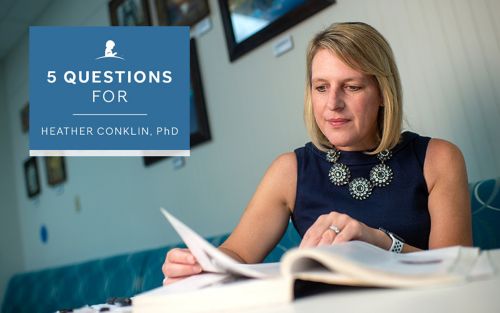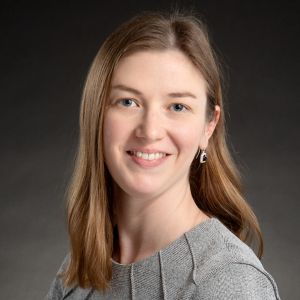St. Jude Family of Websites
Explore our cutting edge research, world-class patient care, career opportunities and more.
St. Jude Children's Research Hospital Home

- Fundraising
St. Jude Family of Websites
Explore our cutting edge research, world-class patient care, career opportunities and more.
St. Jude Children's Research Hospital Home

- Fundraising
5 Questions for Heather Conklin, PhD

Heather Conklin, PhD, is working to better understand neurocognitive function to design and implement cognitive rehabilitation strategies in childhood brain tumor survivors.
This question-and-answer series explores the motivations, inspirations and accomplishments of investigators at St. Jude. Heather Conklin, PhD, is a member of the Department of Psychology and Biobehavioral Sciences and chief of the Neuropsychology Division. Her research focuses on cognitive functioning in brain tumor survivors and cognitive rehabilitation.
1. What inspired you to have a career in psychology? What motivated you to pursue research on neuropsychology and the cognitive health of children treated for cancer?
I was pre-med at Duke University as an undergraduate. As part of our education, they had us shadow multiple physicians. I was inspired by the providers I followed, and I realized I wanted to spend more time with patients. I hoped to understand the greater context of their life experiences to help them reach their health care goals. I also discovered in college that I wanted to conduct research in addition to providing clinical care. Through research, I could impact the outcomes of more patients than those with whom I directly crossed paths.
Earning my PhD in clinical psychology with a focus in neuropsychology allowed me to achieve those goals. My residency and fellowship focused on children with acquired brain injuries, which was during a time when survival rates for children diagnosed with cancer were improving but little research was addressing the long-term impact of their cancer-directed therapy on quality of life. I felt an urgency to address these concerns for a growing number of childhood cancer survivors.
2. Much of your work focuses on neurocognitive outcomes. What is one finding (paper, study, etc.) from your work that you want to highlight? Describe what makes it stand out to you.
I am most excited by our intervention studies that demonstrate cognitive benefits for cancer survivors. We’ve found that gains from these interventions are sustainable over time and associated with changes in brain connectivity, indicative of training-related neuroplasticity. These findings demonstrate that cognitive deficits experienced by survivors are modifiable, offering hope to patients and their families. I am dedicated to discovering cognitive solutions for all childhood cancer survivors that ensure these children can attain important academic, social and vocational milestones.
You can learn about one such study, SJiMB21, in this video.
3. What do you wish more people understood about your field?
Even amongst children with the same diagnosis, who receive the same treatment, cognitive outcomes can vary significantly. We still have quite a bit to learn about risk, resiliency and underlying mechanisms (e.g., socioeconomic conditions, genetics, treatment factors or comorbid conditions) in order to harness the best possible outcomes for all childhood cancer survivors.
4. Are there any other researchers/mentors whose work you admire or who have helped you along the way? How important was their influence on your career path?
The late Raymond Mulhern, PhD, former Chair of Behavioral Medicine at St. Jude, called me when I was on fellowship at Johns Hopkins/Kennedy Krieger and convinced me to interview for a faculty position at St. Jude. I was conducting research in traumatic brain injury and had little oncology experience. He convinced me that my set of skills would better serve childhood cancer survivors, which at the time was somewhat uncharted territory and an area of focus for few neuropsychologists. After coming to campus and meeting with faculty, there was no turning back. I knew this was an area in need and where my work could have great impact. I am not sure I would have the career I do today if Ray had not taken the time to reach out to me and share his vision.
Since being at St. Jude, I have had several mentors that have inspired and supported me, most notably the late Larry Kun MD, who served as St. Jude clinical director as well as Amar Gajjar, MD, Department of Pediatric Medicine chair; Tom Merchant, DO, PhD, Department of Radiation Oncology chair; and Sean Phipps, PhD, emeritus faculty and former Department of Psychology chair. They believed in me at times when I had doubts, and they encouraged me to carry on. Their support and guidance have been instrumental to my success. I hope to pay that mentorship forward to the junior faculty and trainees with whom I work.
5. Where do you draw inspiration as an investigator to continue to study challenging topics?
This one is easy. The patients and families I work with each week inspire me to keep working to ensure a better tomorrow for all children who survive catastrophic disease. My wonderful colleagues and collaborators make the incremental goals we set a reality. St. Jude provides the resources and infrastructure to make it all possible.
Learn more about Heather’s work:
- Study shines light on impact of environment on neurocognitive outcomes
- Clinical trial improves neurocognitive outcomes for childhood craniopharyngioma
- Socioeconomic status plays a major role in cognitive outcomes
- Hearing loss weakens skills that young cancer survivors need to master reading







